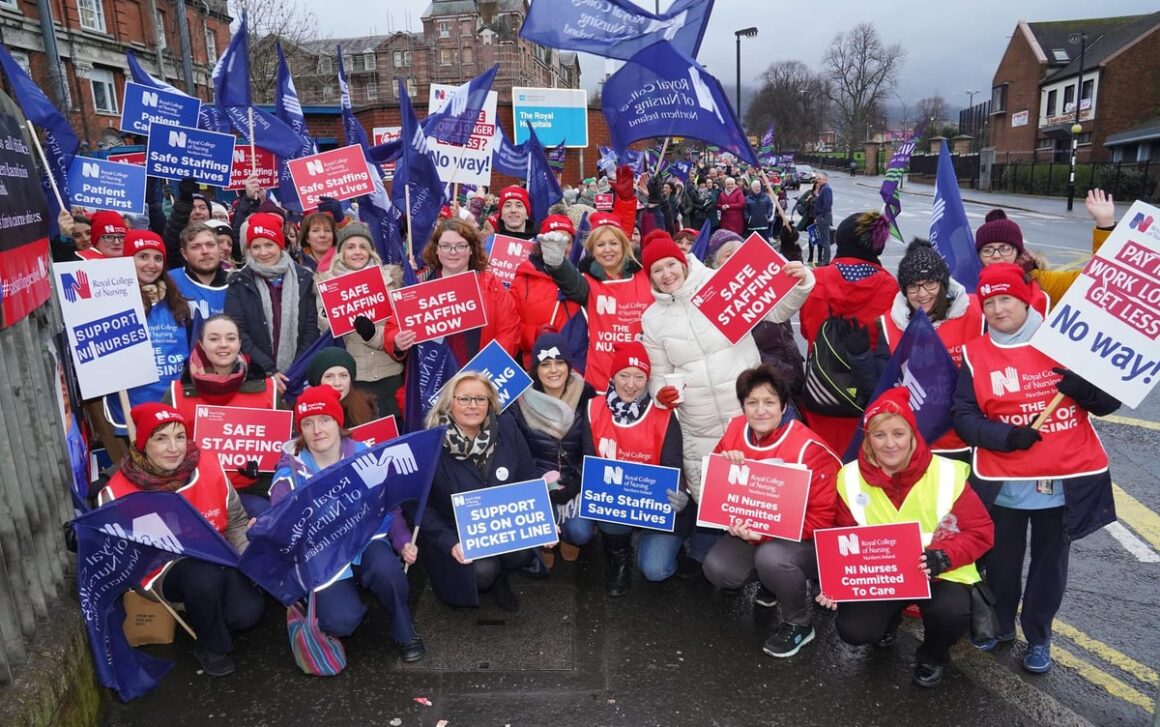Members of the Royal College of Nurses (RCN) in the North and Britain are balloting for strike action over pay. They will soon be joined by other unions balloting their members in health. The Socialist spoke to Socialist Party member and RCN activist, Pat Lawlor, about these important strike ballots.
First of all, what do these ballots represent?
In truth, the ballots themselves do not convey the extent of anger, frustration, and disrespect we feel we have been treated with over the last decade or more. Health workers were initially disorientated and demoralised when we were thrown into the pandemic completely underprepared. We were put at physical risk by our employers and unfortunately, many health workers paid the ultimate price with their lives. The faux support and pretend hero worship by clapping, grinning politicians in Westminster and Stormont who have themselves implemented systematic cuts in pay, staffing, terms and conditions, and services, have only crystalised and sharpened our anger.
The health strike of 2019/20, which brought out the RCN for the first time in its 103-year history, was seen as a partial victory – winning pay parity with England. This strike is keenly remembered as unfinished business, as COVID-19 cut across the remaining issues of staffing shortages and the crisis in services. All these issues have been exacerbated in the last two years across the whole of Britain on top of the ‘cost of greed crisis’ by big business and the rich, whose inflationary demand for profits is pushing nurses into poverty. However, the ongoing strikes and recent pay wins by public and private sector workers are emboldening health workers to act. We are likely to see another historic event with the RCN carrying out its first UK-wide strike in its 106-year history.
The ballots are primarily on pay – what are the other issues at stake for workers across the NHS?
For nurses, pay, staffing and services are interlinked. It is not a coincidence that poor pay and the lowest levels of recruitment are running together. The evidence is clear, nursing vacancies are at a record high.
There are now over 2000 vacancies across Northern Ireland and approximately 47,000 unfilled NHS nursing roles across Britain. Thousands of burned-out, underpaid nurses have left our profession in the past 12 months. I have consoled colleagues in tears, unable to provide basic nursing care, completely overwhelmed with anxiety and stress, who would rather resign than spend one more day at work.
The latest UCAS figures showed a 7% drop in applicants accepted on to nursing courses compared to last year. Although nursing graduates initially earn above the median wage, within 10 years their earnings fall below the median in comparison to similar workers such as teachers or firefighters. Poor pay and career progression are not attractive to new people thinking of entering the profession.
Without enough nurses across our NHS, waiting lists will continue to grow, wards will lie empty, and high-quality patient care and safety in hospitals and community services will continue to deteriorate.
Do you think we will see strike action in health before the end of the year? If so, what will the impact be?
The UK-wide RCN ballot will finish on the 2nd of November with results expected to be declared quickly. A date for action has to be declared within 4 weeks of the result by law. Other unions have begun to initiate their ballots. We would hope we can coordinate action with the other unions across our health service. However, it is likely we will see the RCN go into action before Christmas.
As nurses, it is essential that we maintain a safe service for patients in hospitals and ensure lifesaving emergency and acute services are guaranteed. All non-emergency services will stop. Effectively we will be providing a ‘bank holiday or weekend’ service. As nurses, we will not be creating any more risk for patients than they already face.
This would be the first-ever national health strike including all unions in British history, it will demonstrate the enormous power that health workers have and it is not unimaginable to see opportunities and space opening up to discuss how we can transform society, where the abundant available wealth and resources are redistributed to create a fair, equal and sustainable society for all.
How can young people, patients, and working-class people generally who don’t work in the health and social care sector support NHS workers?
The easy answer is – get involved! Support any protests, demonstrations and strikes.
The NHS we are fighting for is your health service. It provides the safety net of a public-owned universal healthcare service, as well as the security of public-sector jobs and careers with trade union pay, terms, and conditions.
We would encourage you to talk to your family and friends and send messages of support to health workers on strike. If you belong to a union, ask your union and branch to formally support strikes, and raise these issues in your school forums and university student unions.
Our NHS is a fundamental plank of a progressive, equal and fair society for all, it is essential we all join the battle to defend it.












